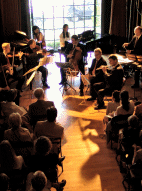

b. 1860 d. 1903
|
Mörike Lieder
Hugo Wolf had a great admiration for the romantic German poet Eduard Mörike. Hewrote his entire body of lieder, with the exception of two, on Mörike's texts, the great songbooks on which the composer's reputation rests. We could possibly place Morike as the successor of Goethe, as Hugo Wolf could be considered the successor of Schubert and Schumann. At recitals, Wolf, the well-read man at the piano, often liked to declaim the poem before it was sung. His collection of 53 poems, astoundingly, were written within a few months in 1888, opened a new era to Wolf. After challenging himself with various composition genres (string quartet, symphonic poem, choral music), he focused on lieder only during three consecutive and fruitful years. Selection from the Mörike Lieder: Der Genesene an die Hoffnung M1 (The Convalescent with hope) It is not by chance that Wolf placed this Lied at the head of the collection. It is a song of praise to Hope for helping him recover from sickness, a kind of thanks to Hope for allowing him to create. The piece starts in the extreme low range of the piano, followed seemingly by the singer. The rhythm starts slowly and accelerates gradually to a state of plenitude, like victory of life over death, a death that almost touched him. Fußreise M10 (Journey on foot) In this piece a traveler offers his praises to God that he has remained healthy enough to travel in spite of advancing age. The music becomes illuminated with the evocation of the Supreme Being. Auf einer Wanderung M15 (In excursion) A simple happiness is presented in this Lied: The walker is happy about the road he has just walked and he enjoys the vision of the coming moments. It is the musical hymn of the traveler. Im Frühling M13 (In Spring) Even though the walker seems to be dreaming peacefully in the countryside, and though the music too seems peaceful, the past is “inexpressible”[should this be “unsuppressible”?], and the future is uncertain. Love is missing. The walker confides in a bird in a ritornello so obsessive that it won’t cease until the walker finally falls asleep. Der Tambour M5 (The Drum) This is military music in which the ostinato rhythm of the piano is king. However, even though this Lied “spins right”, the poor young drum complains about not eating well and would like his suffering to be appeased. This poem is written in a humorous popular spirit. Storchenbotschaft M48 (Stork message) It is difficult for two storks to announce to a young shepherd that he has become the father of twins! The difficulty of communication between the animal world and the human one is highlighted by the transition from the minor mode (the shepherd) to the major one (the storks). The initial light pattern played by the piano throughout the Lied alternates and comes back as light to the announcement of the beautiful news. Sophie Miczke |